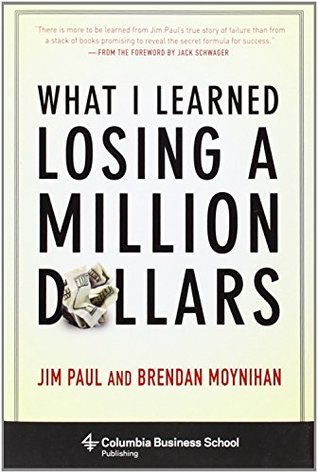More on this book
Community
Kindle Notes & Highlights
Experience is the worst teacher. It gives the test before giving the lesson. —UNKNOWN
You can either play the system or you can let the system play you.
That taught me that there are people for places, places for people. You can do some things and you can’t do other things. Don’t get all upset about the things you can’t do. If you can’t do something, pay someone else who can and don’t worry about it.
Are you more interested in the psychological reward of gold stars than the financial reward of gold coins? Are you trying to be right or to make money? Are you motivated by the prophet motive or the profit motive? To answer, you have to figure out which type of participant you are: bettor, gambler, investor, trader, or speculator.
The basic distinction between the individual and the crowd is that the individual acts after reasoning, deliberation, and analysis; a crowd acts on feeling, emotion, and impulses.
When you’re long and the market is going up, you (1) hope it will keep going but (2) fear it won’t. If your fear is great enough, you will get out and hope the market turns down. When you’re long and the market goes down, you (1) hope it will turn around but (2) fear it won’t.
A preoccupation with wanting to be right or wanting to be perceived as being right, explains people’s tendency to focus on why the market is doing what it is doing instead of what it is doing. They’re constantly asking, “Why is the market up (or down)?” When someone asks, “Why is the market up?” does he really want to know why? No. If he is long he wants to hear the reason so he can reinforce his view that he is right, feel even better about it, and pat himself on the back. If he isn’t long, he’s probably short and wants to know why the market thinks the market is up, so that he can argue with
...more
Remember, there are two kinds of reward in the world: recognition and money. Are you being motivated by the prophet motive or the profit motive? In the markets and in business don’t concern yourself with being right. Instead, follow your plan and watch the money.
Some people don’t even wait to be asked; they offer their regurgitated two cents’ worth on every topic they happen upon in conversation.
Remember, participating in the markets is not about egos and being right or wrong (i.e., opinions and betting), and it’s not about entertainment (i.e., excitement and gambling). Participating in the markets is about making money; it’s about decision making implemented by a plan. And if implemented properly, it’s actually quite boring waiting for your buy/sell criteria to materialize. The minute it starts getting exciting, you are gambling.
To take an example from business, look at powerhouse securities firm Morgan Stanley, one of the most profitable financial institutions in the country. Ever since it converted from a private partnership to a publicly traded company in 1986, Morgan Stanley has achieved the highest average return on equity of any publicly traded U.S. securities firm.27 It’s “avoided disasters and seized opportunities” because it is “fanatical about planning for any contingency, good or bad.”28 And the firm carries out that planning by having staffers write detailed reports about all the consequences for the firm
...more
There is an inverse relationship between your threshold of pain and success in the markets, so as soon as you feel the pain: get out. What if you have on a long position and prices are going up, does that feel good? Do you know what you’re supposed to do? Keep feeling good; leave it alone. It’s working fine. Stay with positions that make you feel good; get out of positions that make you feel bad. You’ll know when you feel bad; if you can recognize anything, you will recognize “this doesn’t feel good.” The minute it doesn’t feel good, stop doing it. It’s that simple.
Every deal we ever did had a back door. The public just didn’t see the back doors.”16 This is just another example of what this book has been saying about the need for a stop-loss (i.e., exit strategy) and of the benefits of applying the positive attributes of a game to the continuous process of business and the markets.


